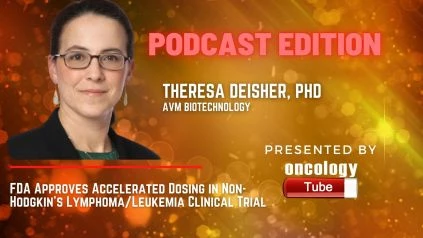Theresa Deisher, Ph.D. from AVM Biotechnology speaks about FDA Approves Accelerated Dosing in Non-Hodgkin’s Lymphoma/Leukemia Clinical Trial.
Three of the cohorts will be eliminated, and the gap between cohorts will be reduced, according to the authorized protocol change. It’s critical for this research to skip the 9, 12, and 15 mg/kg dosage requirements and go straight to the expected effective therapeutic dose of 18 mg/kg. According to preclinical studies and compassionate use data, the target effective dosage for the study’s expansion phase will be 18-21 mg/kg. By skipping the intermediate dosage levels, the dose-escalation component of the research should be completed considerably faster than expected, allowing the efficacy section to begin much sooner than expected.
The medication has been found to be well tolerated in clinical trials, with minor and self-limiting adverse effects. Patients have stated that they are feeling “amazing.†The developing safety profile for treating these critically sick individuals looks encouraging.
A single dosage of AVM0703 causes new gamma delta positive Natural Killer T (NKT) cells to rapidly activate and mobilize. NKT cells have both innate and adaptive immune characteristics. Platelets, red blood cells, and stem cells are spared when AVM-NKT cells take up residence in aberrant cells such as malignancy and autoreactive lymphocytes. These one-of-a-kind AVM-NKT cells have the potential to help treat a variety of severe illnesses, including cancer and autoimmune disorders like type 1 diabetes. Preclinical evidence further suggests that AVM0703 can work in tandem with chemotherapy, allowing total chemotherapy cycles to be shortened while preserving patient response, therefore improving patient quality of life, treatment compliance, and secondary cancer-related problems.

